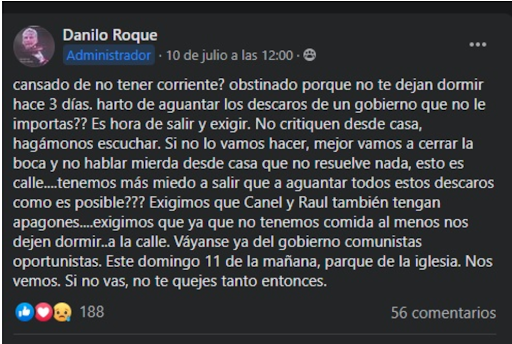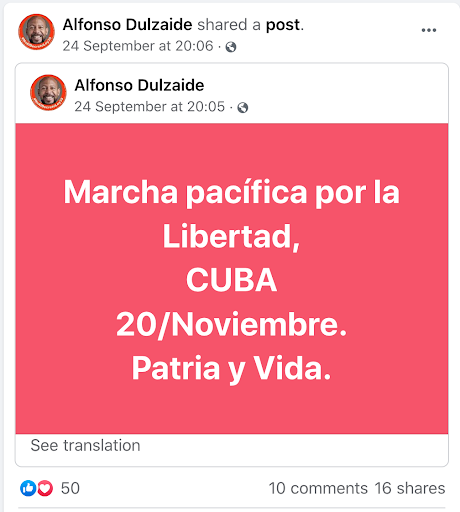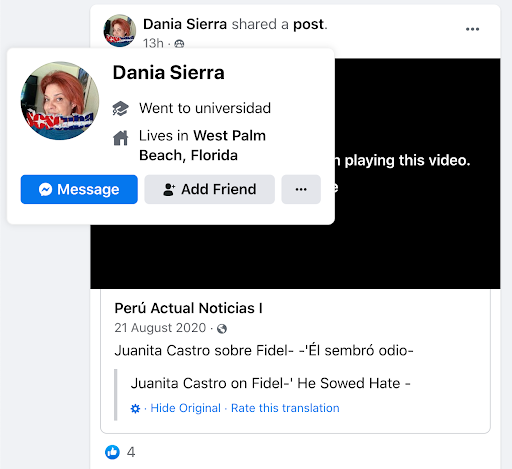By Alan MACLEOD
After gaining access to their private Facebook group, MintPress can reveal that the people who sparked the July 11 protests in Cuba are planning similar actions for October and November.
The group, La Villa del Humor, is widely credited with providing the initial spark that ignited nationwide protests on the Caribbean island in the summer, the most significant demonstrations since the 1990s. On July 10, one of the group's administrators posted this message:
Tired of not having electricity? Stubborn because they didn't let you sleep for 3 days? Tired of putting up with the impudence of a government that doesn't care about you? It is time to go out and demand. Do not criticize from home, let's make ourselves heard. If we're not going to do it, we'd better shut our mouths and not talk shit from home that doesn't solve anything. Are we more afraid to go out than to put up with all this cheek? How is it possible? We demand that [Presidents Miguel Díaz-Canel and Raúl Castro] also have blackouts. We demand that, since we have no food, at least they let us sleep. Hit the streets. Down with the opportunistic communist government now. This Sunday at 11am, Parque de la Iglesia. See you there. If you don't go, stop complaining so much.
The moderator also went on to provide a detailed itinerary of the march, including instructions on where they would march and what items to bring.

The post quoted in English above.
News and images of the demonstrations were immediately signal-boosted by individuals and groups in the United States, including the large and vocal Cuban ex-pat community in Miami, politicians, celebrities, and even U.S. government officials, to the point where even President Joe Biden put out an official statement endorsing events. The massive, global exposure this protest received turned it into worldwide news and rallied U.S.-backed anti-government forces across the island into the streets. However, the movement failed to break into the mainstream of Cuban society and quickly collapsed after it became clear that it had nothing like the numbers needed to achieve critical mass.
October surprise
The administration team of La Villa del Humor considered the July action to be a roaring success, and the first step toward a revolution that will depose the Communist government, in power since 1959. Fresh from their achievements, the group is helping to organize two new actions: a planned general strike in October and a larger set of nationwide demonstrations for November.
Sunday, October 10 is Cuban Independence Day and a national holiday. Organizers are calling for it to mark the start of a general strike (paro nacional in Spanish) to cripple or topple the government. An announcement shared on social media (including on La Villa del Humor) states that organizations across the country are gearing up for a strike next week, with hashtags like #ParoNacionalCuba and #SOSCuba trending. "We summon all worthy Cubans, lovers of freedom, their neighbors, their friends and their families, to a National Strike on Monday, October 11," the communique reads.
A post outlining the planned Oct. 11 nationwide strike.
As with most anti-government activity in Cuba, there is very little transparency. No individuals or organizations are named, the announcements simply ordering all Cubans to put down tools. This leaves many on the island wondering whether this is simply another operation by the U.S. government, which spends tens of millions of dollars annually on clandestine regime-change efforts, creating or propping up anti-government groups for that sole purpose.
La Villa del Humor is playing a significant role in promoting the general strike. On September 23, the group's chief administrator, Alex Perez Rodriguez, recorded a livestream for group members, beseeching them to act as one.
On October 10, we are calling on all of Cuba, on the occasion of another year of independence from Spanish conquistadors, to protest again to demand its rights, to express its longing for freedom and democracy. God willing, all the towns of Cuba will be willing to, and will want to, protest one more time and to take the streets.
"The dictatorship," he insisted, "is about to collapse..." "I am certain that on July 11, Cuba began to head to democracy," he added, before sharing a conspiracy theory about the country's domestically-produced COVID-19 vaccines, claiming that they do "absolutely nothing but make people even sicker."
"Cuba, hit the streets! Do it! And if you're scared, do it with fear."
Peaceful march or beginning of a revolution?
It is, however, the actions scheduled for November 20 that appear to be generating more excitement in the community. Marches across the island are planned, including in Guantanamo, Holguin, Camaguey and Havana, where organizers hope to begin at the iconic Malecón in Old Havana and end up in front of the National Capitol building, the headquarters of the National Assembly of People's Power.
The movement is being outwardly advertised as a "peaceful march in favor of human rights and against violence," and already has a who's who of U.S.-backed figures such as the San Isidro Movement rap group and politician Manuel Cuesta Morúa signed on.
Yet, internally, the goals of the action appear quite different. Sharing an image reading "hit the streets until they [the government] fall," Perez Rodriguez gleefully announced that "all of Cuba is preparing for this!"- quite a different message from the somber and respectful protests being reported on by sympathetic expat media in Florida. Other group members shared advice on planning and getting permits. Organizers hope to bring out thousands of people in Havana and other cities in what they hope will be the beginning of a revolution.
Conservative Cuban blogs claim that the government is already aware of the plans and has already taken action against those individuals whose names were on the protest permits.

Peaceful march for liberty, Cuba, November 20, Fatherland and Life (a common rallying cry of anti-government groups).
A post from Alexander Perez Rodriguez urging people to "hit the streets until they [the government] falls."
La Villa del Humor: by Americans, for Cubans
Although the group is private, it merely took changing my name to a less English-sounding one and pretending I was from the group's home town for the moderators to approve my application. The group itself was created in 2017, ostensibly as a local online message board and marketplace for the people of San Antonio de los Baños, a town of about 50,000 people situated in western Cuba. The name "La Villa del Humor" refers to a biannual comedy festival held in the town.
For a while it did function as such a service, as locals posted complaints about thoughtless neighbors, advertised second-hand goods they wanted to sell, or alerted residents about lost pets. In the past year, however, it has taken a radical turn, becoming a hotbed of anti-government organizing to the point where there are now barely any posts relevant to local people. Indeed, many of the group's posters are not even from Cuba, their profiles revealing that they live in Florida. One particularly frequent contributor even lists his place of work as The Miami Herald, the city's local newspaper. In the hours during and after the July protests, the group's membership more than doubled before the admins set the group to private, meaning all new members need to be pre-vetted.
As such, the group has become a conservative echo-chamber, with users primarily posting anti-communist memes or cartoons or promoting actions against the Cuban government. In essence then, La Villa del Humor is a place where Americans go to cajole the residents of a small Cuban town into overthrowing their government.

Frequent La Villa del Humor posters showing Florida residence.
None of the administration team except Perez Rodriguez reveal their identity, hiding behind pseudonyms, meaning that anyone could be running the group. Perez Rodriguez himself does not live in San Antonio de los Baños. In fact, he does not even live in Cuba; he left the island in 2010 and today works as a pastor at a Seventh Day Adventist church in southern Florida.
The involvement of foreign nationals in the domestic affairs of Cuba is on a level that can scarcely be conceived of in the United States, with even the most adamant RussiaGate proponents stopping short of claiming that Russians directly planned the George Floyd protests or the January 6 insurrection.
What is also clear from interacting with the group and reading its messages is that there is no interest in discussing or improving the lives and rights of Afro-Cubans, despite the fact that corporate media in the U.S. incessantly presented the July demonstrations as so aimed, even chastizing Black Lives Matter and other black liberation groups for refusing to support the protests and siding with the Cuban government. On the contrary, La Villa del Humor continues to be full of pro-Trump content and posts condemning former President Barrack Obama as a dangerous socialist.
"The idols of ignorant people" includes most of Latin America's most prominent left-wing politicians, including Evo Morales (Bolivia), Lula da SIlva (Brazil) and Nicolas Maduro (Venezuela).
A cartoon showing a Cuban woman throwing Raul Castro out of Cuba while shouting "Fatherland and life, dickhead!"
Another meme using "Patria y Vida" (Fatherland and life) as a rallying cry. President Miguel Diaz Canel has been knocked out by the protestors.
Recent pro-Trump content on La Villa del Humor.
A long history of meddling
La Villa del Humor's arc from useful local service to foreign-controlled regime-change operation closely mirrors that of Zunzuneo, a Twitter-like app launched in 2010. Providing a dependable messaging service and undercutting the competition on price, Zunzuneo quickly gained a wide following in Cuba, attracting 55,000 people by 2012 - an enormous number considering the era and the lack of Internet access on the island.
However, at the height of its popularity, it abruptly shut down. Unknown to either the Cuban government or its public was that the app had actually been commissioned and paid for by the National Endowment for Democracy (NED), Washington's regime-change front group. The U.S. government's plan was to first capture the Cuban market and gain the trust of the people, then to slowly drip-feed users anti-communist messaging, making it appear as if there was a groundswell of resentment. Then, one day, users would be alerted that a huge protest was happening and that they should all attend.
The NED was reportedly finding it increasingly difficult to hide who was behind Zunzuneo, at one point even meeting with Twitter CEO Jack Dorsey in an attempt to have him buy the service. An Associated Press investigation later found that the NED chose to pull the entire project rather than risk being caught in the act.
While it is still possible to argue that La Villa del Humor is a quasi-independent forum, Facebook certainly is not, and has aligned itself closely with the American government. Last year, after the Trump administration assassinated Qassem Soleimani, the social media giant removed all content praising the Iranian general, despite the fact that he was by far the most popular political figure in the country. Explaining its decision, Facebook stated that it, "operate[s] under U.S. sanctions laws, including those related to the U.S. government's designation of the Iranian Revolutionary Guard Corps and its leadership." In short, if the U.S. government deems any group or individual to be a terrorist, then social media platforms are required to remove content challenging that idea.
Facebook has also signed a deal with NATO think tank The Atlantic Council, whereby the latter helps curate the news feeds of the Silicon Valley company's 2.9 billion worldwide users. The Atlantic Council's board of directors is a who's who of establishment American power, including senior statesmen like Henry Kissinger, multiple military generals and seven former heads of the CIA. It is also directly funded by the U.S. and other NATO governments, as well as by arms manufacturers. That Facebook chose to hand over partial control of its content moderation to this group gives us a taste of just how close the relationship between big tech and big government has become. Facebook has also admitted to censoring Palestinian voices at the behest of the U.S. government and its Israeli ally.
Quo vadis?
Each year, the United States spends tens of millions of dollars in an effort to oust the Cuban government and install one responsive to U.S. interests. The most recent House Appropriations Budget, for example, allocates $20 million for "democracy programs" in Cuba, helping to support "free enterprise and private business organizations." In case there is any confusion at what "democracy" means, it goes on to insist that "none of the funds made available under such paragraph may be used for assistance for the government of Cuba." This is far from the only source of funding for regime-change operations. The U.S. Agency for Global Media, for instance, is spending between $20 million and $25 million on a similar goal.
Most of that money goes towards an information barrage aimed at convincing the Cuban population that their future lies with the U.S. and away from the Communist Party. Online activities are preferred, as it is much easier to remain anonymous and hide where the money for websites and publications comes from. The U.S. funds groups that produce all forms of public online content, including articles, videos and audio. It also provides training courses for young activists both online and in person, using tactics honed around the world to produce change.
They additionally fund and support Cuban artists, intellectuals and musicians who promote anti-government messages. One particularly notable example is rapper Yotuel and the San Isidro Movement, whose song "Patria Y Vida" has become an anthem for regime change. "Patria y vida" (fatherland and life) is a play on Fidel Castro's slogan "Patria o Muerte" (fatherland or death). Yotuel led a sympathy demonstration in Miami in July.
The CIA also groomed Cuban professor Raul Capote to become the new president of the country. Unbeknownst to the agency, however, Capote was a double agent the whole time, and when the time came for him to lead a protest, he publicly revealed the plan and how he had tricked them into trusting him.
There is no way of knowing for sure who is calling the shots at La Villa del Humor; Perez Rodriguez denies any connection to the U.S. government. However, most of the Florida Cuban community have some links with Washington, even if they do not realize it. The U.S. has spent over half a billion dollars on beaming a TV and radio network into Cuba, creating large numbers of jobs in the process. Added to those are all those working for "non"-governmental organizations dedicated to cataloging human rights transgressions of the Cuban government. There are also contractors paid to build websites, translators, staff paid to work at events, and more. And that is not counting those directly involved in clandestine activities. Thus, the entire local economy is significantly buoyed by the South Florida-based, recession-proof regime-change industry aimed at Cuba, Venezuela, Nicaragua and other Latin American countries.
While Villa del Humor did manage to be the catalyst for a local protest that, in turn, sparked a significant event in Cuban politics, the actual extent of their influence remains highly debatable. What is beyond doubt, however, is that they are indeed planning and hoping that their July stunt was just the beginning and that the end is near for the Communist Party in Cuba. Time will tell whether they can marshal enough forces to take this to the next level. If they are successful, history will absolve them. If not, history will likely forget them.